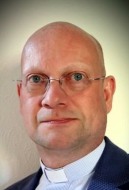The policy of the Wolverhampton and Shrewsbury Methodist District is set out in this link: <https://www.wsmethodi
Unforunately the post of Telford Circuit Safeguarding Officer is currently vacant. For the time being all safeguarding queries need to be directed to our District Safeguarding Officer Sue Holder, or to the Telford Circuit Superintendent Revd Adrian.Burdon
For general information about safeguarding in The Methodist church please click on the following link: <https://www.methodist.o
Book Review
Bernie Sanders
293pp Allen Lane 2023
Is capitalism as we know it compatible with Christianity? One cannot but ask the question after reading this book. Bernie Sanders is a well known politician who has served a lifetime in American politics, including a run for the presidential nomination in 2020. The book may be a heartfelt critique of the political system in America, but much of it carries over to the UK situation.
How is it that wealth is becoming more and more concentrated in the hands of a few individuals while many struggle to live? Is it right that a handful of billionaires should be able to use their wealth to control large sections of the media, or buy influence with government to prevent any threats to their position? What is wrong with the state education system as it stands? Why should ordinary people have problems with access health care while the rich can buy it at will? How can the balance be redressed?
Bernie Sanders presents a radical thesis. He is angry about these injustices and fights against them. Jesus preached radical ideas about society, and incurred the displeasure of the authorities in the process. What would he say about today’s injustices?
David Tidy
Marcus Borg (1942-2015)
SPCK 2017 271pp £12.50
“How to be a Christian in the twenty-first century” is the subtitle.
Every so often one comes across a book which really strikes home. This for me was one such book. Marcus Borg was an inspiring writer and speaker, a New Testament scholar and influential theologian. He was also a leading figure in the Jesus Seminar which aimed to use the best scholarly evidence available to research the life and teachings of Jesus.
This book, published after his death, gathers together the best of his writings on what it means to be a thoughtful Christian in the 21st century, progressive, scientifically literate and socially engaged.
The chapters of the book see Jesus as a true mystic, one who is Spirit filled, and aim to reclaim mysticism for the modern church. He goes on to consider Jesus's powers and the question of whether Jesus was God. He draw out three key strands in Jesus's life and teaching –his mysticism and spiritual life, his compassion and love for people, and a passion for justice in the kingdom of God. This leads on to his vision for Christianity today.
I find it impossible to do justice to the full force of his writing, but for one who has difficulty with many of the theological traditions which have grown up with the church, this book is hugely refreshing and inspiring.
David Tidy
St Petri 1710-2010 – The 300th Anniversary Celebration Volume
At first sight this is an unlikely book to review. But it left quite an impression on me when I read it recently. It is the story of how the Lutheran church of St Peter in St Petersburg first grew up, fought back later against severe adversity only to flourish once again today.
Some 300 years ago Czar Peter the Great was intent on reform to lift Russia out of its backward state for which he encouraged the immigration of skilled foreign workers. He founded the city of St Petersburg where a large expatriate German community grew up in a cosmopolitan city. With the blessing of the Czar they set about establishing a Lutheran church which flourished and by 1833 they occupied a grand church in a prime site in the city centre. But they did not just build the church, they were much concerned too about the health and welfare of the surrounding community, for which they built a welfare centre, a huge orphanage, a school and a residence for the poor. Given the condition of Russia at the time, the need must have been enormous.
Sadly all this counted for nothing a century later when the communists came to power. During the Stalinist purges of the 1930's the church was suppressed and most tragically of all, the two pastors together with several church leaders were seized and shot. The building itself fell into disrepair, only to be requisitioned after the war and turned into a public swimming pool.
When the USSR disintegrated 50 years later, the restrictions on churches were relaxed and the Lutheran community in the city began to regroup. They met at first in another former Lutheran church, St Ann's, which had been turned into a cinema but which was secured for church use on Sundays. When the swimming pool in St Peter's church closed in 1992, the Lutherans were able to take possession of that building again. The day after the pool was drained, they held their first service of the new era standing around the empty pool. An enormous effort was entailed in restoring the church and it was finally reconsecrated in 1997. Today it is the hub of a newly flourishing church community, much involved as before in the welfare of its neighbourhood.
But a further blow struck the Lutherans soon afterwards. When the cinema which had operated in the former St Ann's church closed down, the empty building was taken over without authorisation by a night club. Although the Lutherans finally managed to evict the night club and gain possession of the premises, there was an arson attack and the building was burned out. Undaunted, the churches fought back and raised the large sum of money needed to restore their building.
The story is all the more effective for being told in a terse, matter-of-fact manner, well illustrated with contemporary pictures, not a hint of self pity or triumphalism despite all they suffered and achieved. We have faced nothing like it in the churches here. One can only admire their courage and determination.
David Tidy
“Non-believers outnumber the faithful by widest margin yet” So shout the newspaper headlines. Faith is apparently on the decline. Churches are closing all over the place. The headlines come from figures in the recent British Social Attitudes Survey which show that the number of people who claim to have “no religion” now outnumbers those who do claim to have a religion. So is religion becoming extinct? Are religious folk an endangered species? Let's look a bit closer at the survey figures.
The apparent big decline in religion has actually been among those who claim Anglican affiliation or “C. of E.” Since the year 2000 the overall number of such people has dropped from 30% to 15%, and this almost matches the increase in the “no religion” group. The “C. of E.” link is still quite high for older people, but among the young there has been a major drop, with only 3% now professing an attachment. No longer does the quip apply “I'm not religious, I'm C.of E.” One is more likely to encounter the “spiritual not religious” tag, perhaps indicating disillusion with organised religion. In general there has been a loss of nominal attachment to a religion, a change of the cultural default position from “religion” to “no religion”. People no longer opt out, they opt in instead. The actively anti-religious are only a small minority, most are just indifferent, seeing religion as irrelevant to their lives.
But are people in themselves really becoming less religious? Probably not, surprisingly. It all depends on how you ask the question. Instead of being asked about their religion, if people are asked about how religious they are, a different picture emerges. According to a recent YouGov survey, in every age group from the young to the old around 60% of people consider themselves “non-religious”, about 30% are“somewhat religious” while only 5-15% say they are “very religious”.There is no progressive change from the old to the young. It looks as if it is part of one's make-up and the actual proportion of non-religious people in the population is not thought to have changed much over the centuries.
How far is all this reflected in active church membership? It now stands at just 9%, interestingly very close to the proportion of “very religious” people in the population. Some 30 years ago the figure was 14% so it has certainly been dropping, but will it drop still further or has it consolidated at a hard core of “very religious” people? Time will obviously tell, but there are early signs of a change of direction. There is increasing public interest in religious issues, some would even discern a growing hunger for the spiritual. While certain denominations appear to be experiencing continuing loss, others are advancing steadily. Attendance at cathedrals is known to be increasing, some churches have achieved significant growth in attendance, even large increases at times. Perhaps Matthew Arnold's “melancholy, long withdrawing roar” of the “Sea of Faith” is coming to an end and the ebb tide has started to turn to the flood, despite those gloomy prognostications from the journalists.
What is it that makes some churches grow today while others are still shrinking?
How can Trinity ensure it is part of the flood tide, not the ebb tide?
David Tidy



